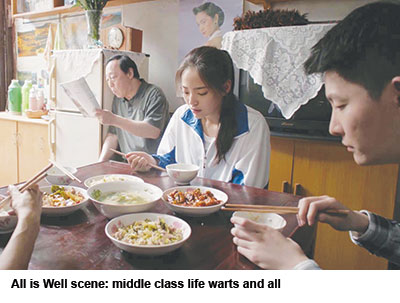
The leaders of five national top-tier universities and ten provincial universities, quoted in China Quarterly, complained about “absence of genuine autonomy” because any moves to enact “devolved powers could be viewed by superiors as disrespectful or as betrayal of the (Communist) Party and party ideology”. This has led to “institutional inertia” because university presidents are concerned “about being seen as ‘rocking the boat’”. “To be honest, we don’t want to stir things up,” explains one university president quoted in the paper, who said that any reform “tends to affect employees negatively, (meaning) I could be criticised and (the government) could cut the amount of government funding we receive”.
Ten of the 15 presidents interviewed admitted they are reluctant to initiate new proposals because it could affect their careers. Many cite the influence of government-appointed party secretaries based in each university. One president said his plans to use more original English language textbooks were blocked by government officials and that he was warned “not to go against mainstream ideology”. Another’s proposals to introduce peer review in research, rather than rely on the judgement of internal university administrators, were also rejected.
Party secretaries at the 15 universities also offered interviews, with one referring to the party’s “absolute leadership” over institutions. Another insisted that party control is vital because an “ideological war between us (and the US) is always on, and can be a matter of life and death for our regime”.
Frank Mols, senior lecturer in political science at University of Queensland, who co-authored the paper with Hu Jian, from Jiangxi University of Finance and Economics, says the interviews indicate that an “impressive series of official reforms to increase the autonomy of Chinese universities… have had remarkably little impact on everyday practices”.
All is Well sensation
It is no mean feat to be one of the Top-10 trending hashtags on Weibo, China’s equivalent of Twitter, for 20 consecutive days and counting. All is Well, a show on provincial television which premiered on March 1, has just done that.
The serial depicts the story of a fictional Chinese family torn by internal conflict. The female protagonist, Su Mingyu, is barely on speaking terms with her widowed father and one of her two brothers. The father is a nagging crank who expects his two adult sons to bankroll his lavish tastes. This leads to constant bickering between the brothers, neither of whom wants to be called unfilial.
Episodes of All is Well have been streamed more than 390 million times. That exceeds the online viewership of the next most popular television series by 278 million. From The Simpsons to Game of Thrones, dramas about bickering families are common in many countries. But in China, the Communist Party prefers entertainment to be unchallenging. So the questioning of blind attachment to traditional values in All is Well is causing a stir. Viewers are transfixed by its rare portrayal of middle-class life, warts and all.
Many Chinese can relate to the Su family’s troubles. The daughter holds a grudge against her father and especially against her late mother, for having mistreated her while pampering her brothers. As a child, she was made to wash her brothers’ clothes. Her parents turned a blind eye when one of her brothers beat her. For many female viewers born before 1979, when China introduced a one-child-per-couple policy (changed to two in 2016), such scenes have brought back painful memories. Some have used social media to share their own tales of sexism within the family.
But the biggest reaction has been to the drama’s critique of filial piety. Even today, the Confucian principle of unswerving loyalty to one’s parents remains hallowed (as in India). Many people say the best measure of adherence to this virtue is whether a son takes good care of his parents in old age. A recent poll by Toutiao, a Chinese news app, found that 54 percent of elderly people in China get more than half of their expenses covered by adult children. Partly, this is due to a patchy pensions system. But it also reflects a culture of “never saying no to your parents”, says an All is Well fan in Beijing.
In the series, however, the widowed father doesn’t attract much sympathy. He throws tantrums and insists that his eldest son buy him a three-bedroom apartment (the son grudgingly does so). Commentators on social media have taken to calling the father a juying (“giant baby”) — a characteristic common among parents in real life, they say. The Su children do their duty, but the audience is expected to applaud the resentment they express.
There have been mixed reviews in state media. One newspaper says that the “realistic plot and acting” has touched the “pain points” of many viewers. Beijing Daily, however, says the drama is “unrealistic”. It says All is Well caricatures elderly parents “unreasonably” by ascribing “every possible bad quality” of old people to one character. Someone representing every virtue admired by the party would presumably, be more acceptable.
(Excerpted and adapted from The Economist and Times Higher Education)
Also read: China: Unemployment spectre fears